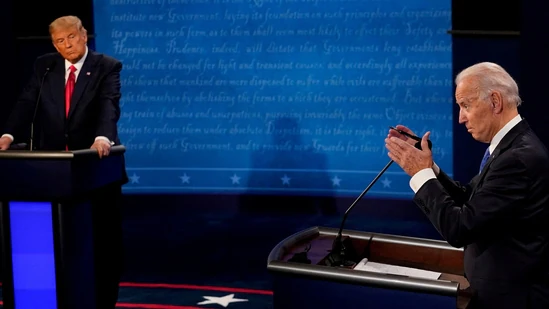27 June 2024 Punjab Khabarnama : I’m bracing myself for the cringefest of oversimplification, misrepresentation and outright mendacity that Americans call a presidential “debate.” Pundits will declare either Joe Biden or Donald Trump the winner. But some of the losers are already clear. They include the muses of nuance, insight and intellectual honesty.
Let’s concentrate on just one topic: foreign policy. The world, as pretty much everyone in it will have noticed, has fallen into disorder. Russian President Vladimir Putin is trying to annihilate the statehood of a sovereign country, Ukraine. Sudan and Myanmar each descended into yet another civil war. Hamas terrorized and brutalized Israel, and Israel then bombed the Gaza Strip into rubble. The Houthis are disrupting global trade. China is harassing the Philippines and threatening Taiwan, while North Korea menaces the South. The list goes on.
Because these events happened on Biden’s watch, Trump will blame them on his opponent. The insinuation is that a US president bears responsibility for anything that happens anywhere, and chaos abroad must be confirmation of the MAGA meme that Biden is “weak,” whereas President Trump was, and again will be, self-evidently “strong.”
To make this propaganda — for that’s what it is — work, the MAGA crowd cherry-picks timelines. They emphasize, for instance, that Putin annexed Crimea during Barack Obama’s term and went for the rest of Ukraine during Biden’s, but somehow stayed meek throughout Trump’s. The Middle East, in their telling, was heading toward peace during the Trump years, but once Hamas and its Iranian backers got a whiff of Biden’s weakness, they let slip the dogs of war. This is the sort of logic that Robert O’Brien, Trump’s former national security advisor, employs to claim that in a second Trump term “the United States would be strong, and there would be peace.”
The reality is that causes and effects are fiendishly hard to assign, and this kind of oversimplification distorts analysis enough to create the risk of disastrous policy choices in the future. That applies not only in geopolitics. Who exactly, for example, should get blame or credit for the economy or inflation? The current president, his predecessors, the chairman of the Fed, regulators, bankers or exporters in the US, or perhaps in China or the European Union? In international affairs, the linkages are especially complex, in part because we never have counterfactuals.

